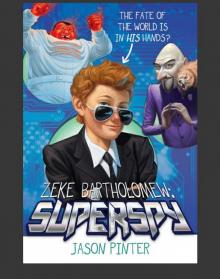- Home
- Jason Pinter
Hide Away (A Rachel Marin Thriller) Page 26
Hide Away (A Rachel Marin Thriller) Read online
Page 26
“Get Albatross,” George said. “Once we have Wickersham, the Drummond sister, and this money man, one of them will cop to the killing. Or we charge them all with conspiracy to commit murder and see which one sings first.”
“I like the way you think, Lieutenant,” Tally said.
“My wife said that to me the other day,” George said wistfully. “But I think she was being sarcastic. Anyway, get on it. Bring these bastards down.”
Serrano said, “With pleasure, sir.”
George walked away, and Tally’s cell phone chimed. She clicked it open and smiled.
“Phone and text records for one Caroline Drummond from our friends at Verizon,” she said. “Let’s get to work.”
Serrano and Tally were able to electronically eliminate over 97 percent of Caroline Drummond’s incoming and outgoing phone calls for the five-year duration of the records they received. Calls to and from her work, various restaurants for reservations and deliveries, and friends and family they were able to confirm as legitimate and unconnected to Wickersham or Albatross.
The other 3 percent consisted of hundreds of calls and texts to and from Samuel Wickersham, many of which contained graphic sexual content. The communication started slow, increased in volume and duration over the next two years—which coincided with Constance Wright’s troubles and her divorce from Nicholas Drummond—and then tapered off once the legal troubles ended.
“What is a purple-headed warrior?” Tally said, reviewing the text messages.
“Sounds like something you get diagnosed with after a bachelor party in Las Vegas,” Serrano replied.
“And why would anybody want one of those in their”—Tally squinted—“spicy love muffin? Is this how people sext these days? Hell, when I want a romantic night with Claire, I just come home with a bottle of rioja and put on some Coltrane. I feel so old fashioned.”
“I just open Tinder and start swiping right,” Serrano said.
“You are not on Tinder.” Serrano stayed silent. “Oh God, you are. Wait, have you matched with anyone on the job?”
“I plead the Fifth so as not to incriminate myself,” Serrano said.
“Ugh,” Tally said, mock shivering. “I don’t want to know.”
After removing the Wickersham correspondence from the list, there were still seventeen phone numbers they could not confirm.
One by one, they cross-referenced those numbers with Sam Wickersham, Nicholas Drummond, Isabelle Robles, Christopher Robles, Nestor Aguillar, Stefanie Steinman, and anyone at J&J Accounting. They were able to eliminate thirteen of the seventeen numbers as incidental. They then called the remaining four.
The first number went to a man named Ricardo Jimenez, currently living outside of Denver. Jimenez admitted to having had a sporadic consensual sexual relationship with Caroline Drummond during the period in question, which had ended after he’d accepted the job he presently occupied. Jimenez had married last year and now had a daughter on the way. Nothing about the situation seemed extraordinary, other than the fact that it would have broken Sam Wickersham’s heart to know he hadn’t been the only one sharing Caroline Drummond’s bed during that time.
Tally asked Jimenez if he’d ever heard Caroline discuss the name Albatross or any of the other people on the list. Jimenez said he couldn’t recall for certain but didn’t think so. Tally thanked Jimenez for his time. He seemed on the up-and-up.
The second number was out of service. Serrano checked the phone company’s records. The number had once belonged to a psychic / tarot reader named Diane Loderbaum. Serrano found Loderbaum’s now-defunct website, featuring a banner that read: “Your Future Is in the Cards.”
Based on the enormity of outgoing calls to that number, it seemed that Caroline Drummond had a regular Tuesday-night call with Ms. Loderbaum. Every call lasted between fifty-eight and sixty-two minutes, and it had been consistent for the better part of three years. Tally estimated Caroline Drummond must have spent around $10,000 to $20,000 getting psychic advice from Diane Loderbaum.
They were able to track down Ms. Loderbaum, now working as a professional matchmaker in Saint Louis. She acknowledged regular communication with Ms. Drummond.
“Why did she call you so often?” Tally asked.
“Same reason anyone called me,” she said. “She wanted to understand where her life was going. She seemed fairly unhappy, unsure of her direction, and thought I could help her untangle the threads of her life.”
“Did you?” Serrano asked.
Loderbaum sighed. “To be frank, I got the feeling that Caroline Drummond was the kind of woman who liked to talk about doing the right thing, without actually doing it. Making the effort made her feel good. Absolved. Like she cared.”
“How so?”
“Well, she kept talking about her guilt over stringing some young kid along. She was sleeping with him but didn’t have any real feelings. But boy howdy, he fell for her harder than a ton of bricks.”
“Does the name Sam Wickersham mean anything to you?” Tally said.
“She never used real names,” Loderbaum said. “But she mentioned a man she was seeing, a Hispanic man, whom she saw a real future with. Then he moved away for work, and they broke up, and it seemed to hit her hard. After that, we didn’t speak much. And then we stopped.”
“So why did you get out of the psychic business?” Serrano asked.
Loderbaum laughed. “No room in today’s marketplace for psychic phone lines. People get all that stuff for free now on the internet.”
They thanked Ms. Loderbaum for her time.
The third number was for an Italian restaurant called Mutz & Friends. When Serrano reached the store, the proprietor, a man named Vincent Biancamano, told him that Caroline Drummond had ordered the same meal every Thursday for as long as he could remember: a soppressata and mozzarella sandwich with oil, vinegar, lettuce, tomato, roast peppers, and onions on an eight-inch Italian roll with a side salad.
Serrano asked Biancamano if he remembered Drummond ever coming into the shop with anybody. Biancamano said she always seemed like a bit of a loner, never came in with anyone, never seemed up for small talk, left the store like she was always in a hurry, but always tipped.
He did note that Drummond hadn’t called in any orders in several months—they weren’t listed on Seamless—and wanted to make sure she was OK. Serrano said she was, not to worry, but if he could remember anything out of the ordinary to let him know.
“I feel bad for Sam Wickersham if he ever kissed Caroline Drummond after she ate one of those oniony sandwiches,” Serrano said.
“Reminds me of the time Lieutenant George’s wife started wearing that perfume—what was it called?”
“Oh God, I remember that,” Serrano said.
“He came in every day smelling like a lilac that had thrown up on a sugar cane. And I thought that Yves Saint Laurent he wears was bad. That couple needs to get their olfactory senses checked.”
“I didn’t want to shake his hand because I was worried I could contaminate crime scenes with whatever perfume molecules landed on me.”
“On that note,” Tally said, “it wouldn’t kill you to wear a scent occasionally. Not saying you need to drench yourself in Hugo Boss, but smelling like something other than whatever clothes you picked up off your floor that morning wouldn’t be so bad every once in a while.”
“So you’ll come to Sephora with me then?”
Tally laughed. “Only if I can invite Claire to witness this.”
“Deal’s off. On to the last number.”
The area code was 917. And the calls were only incoming, no outgoing.
“A New York City number,” Serrano said.
“And most likely a burner phone,” Tally said. “Look. The calls are frequent for the year leading up to Wickersham’s testimony, then cease completely once the proceedings finished.”
Tally called the number. It didn’t surprise them when the number came back no longer in service.
�
��We can get a warrant on this line,” Serrano said. “Most burners these days have built-in GPS. If the caller made enough calls from a single location, it could provide a lead as to where they live or work.”
Based on Wickersham’s admission of fraud and perjury, the payments from Albatross, and his relationship with Caroline Drummond, Serrano had no doubt they had sufficient probable cause to get a warrant on the cell phone number.
“Judge Watson is probably up,” Tally said. “Send him the affidavit.”
Serrano called the judge, then sent over the warrant request. It was approved in less than two hours.
As soon as he had the warrant, Serrano submitted it to all the major burner cell phone manufacturers and suppliers. He got a call back half an hour later from a company called CodeTek. They confirmed the phone was one of theirs, a Samsung model using Verizon’s network, and their distribution center had packed it in a shipment that had gone out to electronics and convenience stores in Manhattan. Serrano confirmed that the model in question had GPS built in.
Serrano then contacted the Data Forensics Unit of the NYPD and asked them for GPS tracking on the number for the one-year period in question. He hoped they would find enough similar data points to narrow down the location of the person who’d used it. And he was willing to bet that whoever had been using that phone had been coordinating with Caroline Drummond about Albatross.
While they waited for the records to come in, Serrano went upstairs to the Bunk to check on the Marin children. They were curled up next to each other, lying facedown, elbows touching. Eric was playing some sort of shoot-’em-up game on his phone, while Megan was flipping through a copy of Vanity Fair. They looked content enough. But the frequency with which Rachel’s children spent time in the station upset Serrano. It had gotten to the point where they didn’t even seem inconvenienced by it. Just another bed in a string of beds.
Serrano wondered what circumstances had forced them to get used to such consistent turmoil in their lives.
Then he went to check on Rachel.
She was lying on her back on one of the metal benches in the holding cell, staring at the ceiling. Her eyes were open. Her mouth was moving.
“Rachel, how are you—”
“Shh . . . ,” she said. “I’m trying to figure out how many people have been in this cell.”
Serrano laughed. “I’m not even sure I know the answer to that.”
“Let’s see,” she said. “Currently, there are four occupants. In any given day, a day like today, I estimate between four and six guests. But that rises in the summer—people tend to have shorter fuses in hot weather—and around the holidays. People get depressed, drink more, take things out on loved ones or former loved ones. And in the winter, when days get shorter and it gets dark earlier, people start drinking earlier. Which leads to an increase in bar brawls and DWIs. So for the two weeks before and after Christmas and Thanksgiving, I’m estimating it goes up to between seven and nine. From Memorial Day to Labor Day, six to eight. With a spike on July Fourth. Morons who don’t know how to properly light fireworks or drive speedboats. So in a calendar year, I’m estimating the number of guests in the Ashby PD holding cells to be one thousand, eight hundred and eighty-three.”
Serrano stood there, dumbfounded.
“This police station itself was constructed in 1967. Certainly crime rates were higher back then—the civil rights era, Vietnam protests—and precincts weren’t monitored nearly as closely as they are now. Can you imagine how quickly water fountains would have been desegregated if social media existed in the sixties to mobilize protests? Or how many cops would have been arrested, charged, and, let’s be honest, executed? It’s a well-known fact that a number of cops were actively involved in the Ku Klux Klan—”
“You were telling me how many people have been in this cell,” Serrano said, losing his patience.
“Oh, right. One hundred and four thousand, three hundred sixty-eight people.”
“I’ll check with the lieutenant and get back to you,” Serrano said. “And if you’re right, you get a free sandwich.”
“Please thank Lieutenant George for me,” Rachel said. “He’s been good to Eric and Megan.”
“I will.”
“I wonder how many of those people you personally put in here,” Rachel said. “I bet I could estimate.”
“Don’t you have anything better to do with your time?” Serrano said.
“Not at the moment, no. Instead of a sandwich, how about the leniency of the court?”
Serrano shook his head. “The judge’s bench is above my pay grade. You know, I was wondering. Whatever happened to that guy you were out with? You didn’t seem all that upset when we showed up.”
“Adam,” Rachel said. “The next day he texted me an emoji of an eggplant and a doughnut, which I’m pretty sure means he wanted to have sex with me. Or have sex with a doughnut, maybe a threesome with an eggplant involved somehow. So I sent him an emoji of an eggplant and a knife to let him know that if he ever came near me, I’d chop his dick off. Then I blocked him.”
“Reminder: never text emojis to Rachel Marin.”
“Now if only you can educate the men of Ashby.”
“I’ll do my best,” Serrano said.
“I spoke to my lawyer,” Rachel said. “He thinks I’m going to get off without even a fine.”
“Is that so?”
“When I went to the Velos offices, I had no idea that Sam Wickersham was part of an ongoing criminal investigation. That’s the honest truth. So therefore I couldn’t have knowingly impeded one.”
Serrano mulled it over. Then he shrugged. “I’m not a judge.”
“No. That’s above your pay grade,” she said with a wicked grin. Then it dissipated. “How are Eric and Megan?”
“They’re fine. Eric is gaming. Megan is reading.”
“Just another day.”
“They seem a little too comfortable. Like they’re used to having their lives turned upside down.”
Rachel looked away.
“Tell me what happened to you,” he said.
“Thanks for taking care of them,” she said, ignoring the comment. “Hopefully I’ll be out of here tomorrow.”
“But for how long?” Rachel said nothing. Serrano nodded. “Think about what I said to you the other night.”
Then he left and went back to his partner.
“How’s the Marin family doing?” Tally said.
“Fine. Which is bizarre in and of itself.”
“Well, guess who I just got a call back from. Man named Aleksy Bacik. He’s a senior Realtor with Irongate Properties. He sold Rachel Marin her house.”
“No shit. What did Mr. Bacik say?”
“Well, he wouldn’t give me her application package without a warrant,” Tally said. “And since the charge we’re holding Rachel Marin on is unrelated to her financial situation, I don’t think a judge would grant us one.”
“It was worth a shot.”
“But,” Tally said, “he seemed a little spooked that he was getting a call from the police to begin with regarding Rachel Marin. So he gave me the name of the lawyer she used to negotiate the contract. Bacik said this guy could give us more information. He strenuously implied that he wanted no part of anything Marin related. Then he hung up.”
“Who’s the lawyer?”
“His name is James R. Franklin, of Franklin and Rosato, a law firm in Darien, Connecticut. They specialize in personal injury, medical malpractice, and sexual assault. And they’re not ambulance chasers. These guys are heavy hitters. Franklin is a civil litigation attorney who’s settled suits in the millions.”
Serrano said, “Why the hell would a litigation attorney in Darien, Connecticut, be involved in a real estate transaction in Ashby, Illinois?”
CHAPTER 31
Rachel had been right. Because her lawyer could legitimately argue that she had no knowledge of Sam Wickersham’s involvement in an ongoing police investigation, the charge of
interfering with a criminal investigation didn’t stick. She was released in the morning having paid no fine, with an extra crick in her back from the metal bench in the holding cell, while having been up all night worrying about her children.
She thought about everything Serrano had said. Rachel was at war with herself. Everything she did to try to expose Constance Wright’s killer pushed her children further away. Further away from her. Further away from a normal life. Their grasp on normalcy was already a thread, already tenuous. Now it seemed like Rachel was standing over that thread with a chainsaw, revving it with glee.
She drove the kids to school. Megan sat in the back, reading a Vanity Fair. Eric stared out the window. Silent.
“Where did you get that magazine?” Rachel asked, peering at Megan in the rearview mirror.
“From the Bunk,” she replied.
“The Bunk?”
“It’s where we slept. Mr. Serrano said we could play with anything in there.”
“Did he say you could take that?”
“No,” she said, concerned. “Are you going to tell him?”
Rachel smiled. “No. But if you get to any bad words, you have to promise me you’ll put it down.”
“OK. Hey, Mom?”
“Yes, hon?”
“What’s . . . lin-ger-ee?”
“Lingerie,” Rachel said. “Put it down now. That’s the last copy of Vanity Fair you get to read until you go to college.”
“That’s fine. Everyone in this magazine is in their underwear. It’s weird.”
Rachel laughed. Then looked at Eric. He didn’t move. Said nothing.
“Eric, are you OK?”
He didn’t reply.
“Eric?”
Nothing.
“Are you ignoring me?”
Still nothing.
“Please, talk to me, hon.”
Silence.
She took a deep breath and said, “Sean!”
Eric’s head sprang up. His eyes were wide. Megan’s mouth fell open.
“You told me we needed to forget about those names,” he said quietly.
“I needed to do something to get your attention,” she said. “Answer me, please. Are you OK?”

 Hide Away (A Rachel Marin Thriller)
Hide Away (A Rachel Marin Thriller) A Stranger at the Door (A Rachel Marin Thriller)
A Stranger at the Door (A Rachel Marin Thriller) The Darkness hp-5
The Darkness hp-5 The Stolen hp-3
The Stolen hp-3 The Guilty hp-2
The Guilty hp-2 The Hunters
The Hunters The Mark hp-1
The Mark hp-1 The Castle: A Ripped-From-The-Headlines Thriller
The Castle: A Ripped-From-The-Headlines Thriller The Hunters (henry parker)
The Hunters (henry parker) Zeke Bartholomew
Zeke Bartholomew The Mark
The Mark Faking Life
Faking Life![[Henry Parker 01.0] The Mark Read online](http://i1.bookreadfree.com/i2/04/08/henry_parker_01_0_the_mark_preview.jpg) [Henry Parker 01.0] The Mark
[Henry Parker 01.0] The Mark The Fury hp-4
The Fury hp-4 The Stolen
The Stolen The Guilty
The Guilty